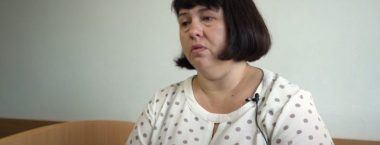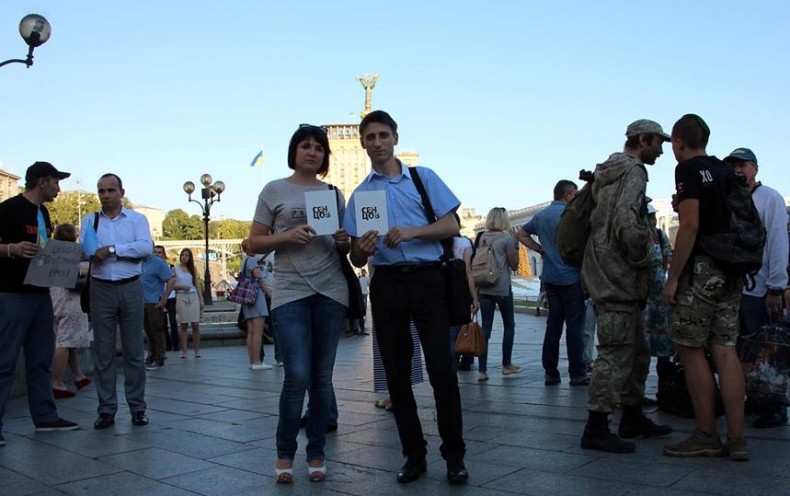
“People in their homes were dying from cold” – a nurse from Kharkiv
Interview by Taras Viychuk – I am 42 years old. I live and work in...
17 May 2022
17.06.2017
The new interview from the series “Women Human Rights Defenders, Who Change Ukraine”, dedicated to women who work with the Ukrainian Helsinki Human Rights Union. This time, Anna Rassamakhina, a lawyer of the specialized public reception on Crimea, has been interviewed.
Anna Rassamahina has graduated in 2008 and got the Degree in Law with distinction from the Yaroslav Mudryi National Law Academy of Ukraine. Before the Ukrainian Helsinki Human Rights Union, she worked as a lawyer in several companies, providing legal support, represented before the courts and so on.
– Please share your history of involvement in the human rights movement in Ukraine. Why did you decide to work in this field?
– It happened quite by accident. I moved from Sevastopol to Kyiv after its occupation in May 2014. I had no job, but I was not scared. In Sevastopol, in recent years I worked as a lawyer at several enterprises. So, I was looking for approximately the same job in Kyiv. The human rights theme was generally unknown to me. But then I came to the interview at UHHRU. At that time, the project of specialised public reception on Crimea had just begun. I decided to try working in the entirely new field. So, in 30 years, I began my work as a human rights defender, and it looks like it will be long-lasting.
– Where have you got education and knowledge of human rights?
– I graduated from the Yaroslav Mudryi National Law Academy of Ukraine in 2008. In recent years, I have participated numerous training seminars for human rights defenders.
– What is your area of focus in the field of human rights?
– I work with a specific theme – internally displaced persons (IDPs) and the law of temporarily occupied territories. Although, in fact, this is a very wide range of issues. IDPs face the same problems as all other residents of Ukraine, just most of them are in worse conditions than those who have not left their homes.
IDPs complain about the inefficiency of state agencies, indifferent attitudes of civil servants, insufficient social benefits. No one is prepared for occupation, and the state is unable to quickly and efficiently respond to complex challenges, so problems of IDPs are more than enough.
Temporary occupation creates many legal issues. These are property issues of inhabitants of the occupied territories, educational issues, IDs, freedom of movement and more. I defend people in court, although it is necessary also to appear in media with the information on temporarily occupied territories, to prepare information materials, instructions for our target audience. Every day, some issues are resolved and new ones arise.

Often, we win, because we are dealing with outright violations of law and human rights. Unfortunately, each such violation is overcome with great tension. Lawyers, involved in such cases, must be highly qualified. Sometimes you have to spend a lot of energy just because officials have not read the law or do not know legal categories. But I am sure that it will change over time, as I see enough of motivated, highly qualified people with whom we do one thing.
– Did you work with the theme of women’s rights?
– No, I did not. Because our reception works only with issues of temporary occupied territories.
– In your opinion, what are the greatest successes of the human rights movement in Ukraine?
– I’ll start something from afar. I believe that the cause of most problems in Ukraine and one of the main reasons of Maidan was the almost complete absence of dialogue between authorities and society. So to say, there was no protocol for communication between them. Nowadays, this protocol of communication, these rules are being slowly and gradually formed, and in the process, in my opinion, Ukrainian human rights defenders play a very important role in it.
Often, we win, because we are dealing with outright violations of law and human rights.
Since 2014, many human rights non-profit organizations have been established in a variety of ways. Sometimes these organizations are random, do unnecessary things, do not cooperate with each other, but most importantly – they are engaged in a continuous dialogue with authorities. And the established forms of communication are being formed gradually. If communication is fast and efficient – the state can develop and be successful. Of course, we are at the beginning of this path. Our post-Soviet, post-totalitarian system of power can hardly overcome this inertia, but I am sure that everything is ahead.
– What are challenges of the modern human rights movement in Ukraine?
– In my opinion, the main challenge and the main danger is a temptation to surrender, to give up everything in one day. As long as small results need superhuman efforts, and it is very tiring. If a person is immersed in human rights activities, she/he has the impression that everything is only negative around her/him and all efforts are futile. Therefore, individual human rights defenders and human rights movement as a whole should notice small victories and achievements. We must remember that all these achievements have cumulative effect and move on.
– In your opinion, is it enough attention paid to gender issue by the human rights movement?
– I cannot answer this question. I see a lot of initiatives, events, and training on gender issues, but I cannot say if this is enough, because I am engaged in an entirely different sphere. I believe that gender issues are now very important for Ukraine – so that the more attention, the better.
– Gender-based violence is a serious problem, particularly in Ukraine. In your opinion, what should be done to improve the situation?
– Our society is full of violence. Violence against subordinates, strangers, violence against children, sexual minorities, opposition groups based on various characteristics. Gender-based violence is only a part of this great problem. Of course, we have to work separately with gender-based violence – to create rehabilitation centers, hotlines for victims of domestic violence, to provide free legal and psychological assistance to lobby the adoption of legislation against domestic violence, educational work on the topic of violence. All this has an obvious effect and reduces violence.
If a person is immersed in human rights activities, she/he has the impression that everything is only negative around her/him and all efforts are futile. Therefore, individual human rights defenders and human rights movement as a whole should notice small victories and achievements.
But apart from that, society has to gradually develop to the point where gender-based violence, violence in the family will be something unacceptable. Today, physical and sexual abuse in the family are seen by most as inappropriate, but the psychological and economic violence, unfortunately – no. Many adults believe these kinds of violence are internal affairs of the family. We need to generate respect for human dignity, freedom of person to choose the own way, freedom of choice of sexual behavior, freedom to give birth to children or not.
While the vast majority of Ukraine to some extent shares the old stereotypes about the role of women primarily as mothers and wives, inferiority of a lonely and childless woman and so on – the basis for gender-based violence will be retained. I have hope for a new generation, which are formed outside of the system of views.
– What or who inspires you the most in your human rights work?
– I am inspired by my colleagues, my own professional victories, and achievements, which, fortunately, are quite common. But our clients with whom we work inspire the most and give strength. Among them, I meet strong, confident people who are stubbornly moving towards their goals. I hope I also can give someone hope and inspiration. So, we move together, and in general, I can say that I am very happy.
Prepared by Tamara Martseniuk
If you find an error on our site, please select the incorrect text and press ctrl-enter.

Interview by Taras Viychuk – I am 42 years old. I live and work in...
17 May 2022

The Kharkiv Human Rights Group (KHRG) is documenting international crimes (genocide, crimes against humanity, war...
14 April 2022

The Global initiative “Tribunal for Putin” invites to a closed online event “Kyiv region under...
12 April 2022

The Global initiative “Tribunal for Putin” invites to a closed online event “Kyiv region under...
12 April 2022